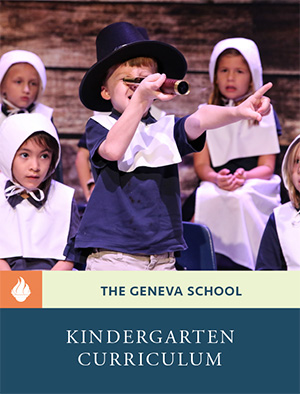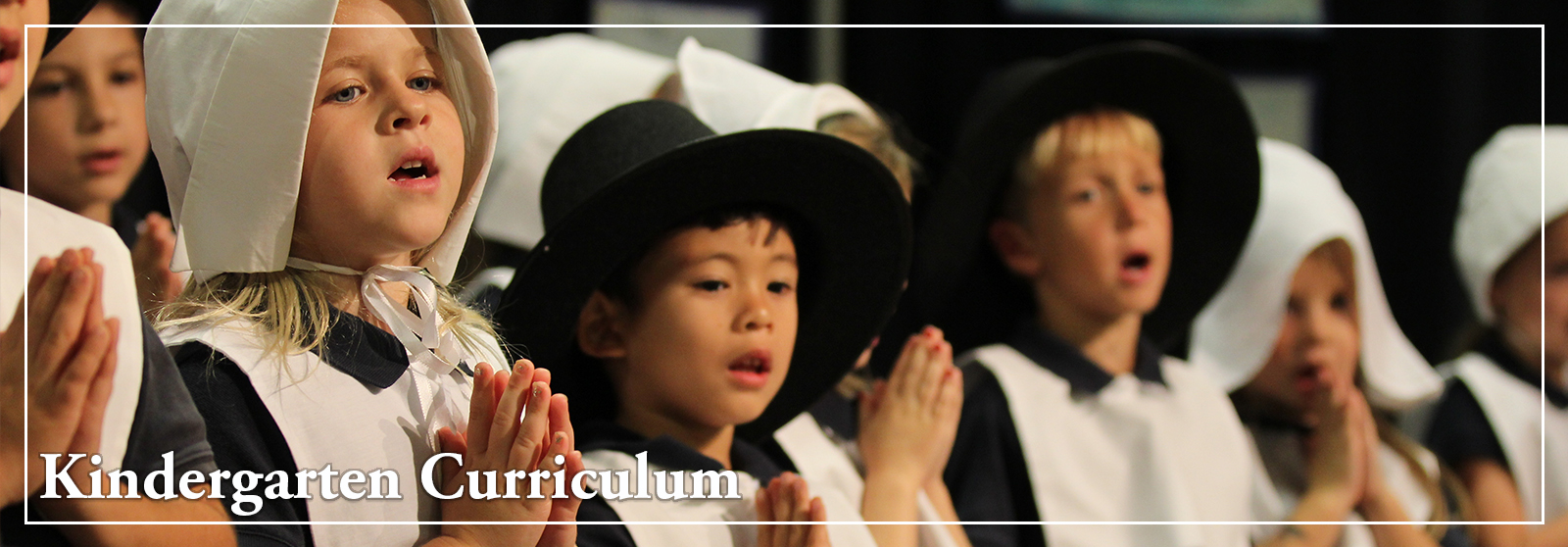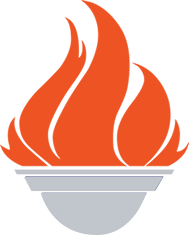Kindergarten Curriculum

The Irish poet William Butler Yeats tells us that education is not a filling of a bucket but the lighting of a fire. In kindergarten, we seek to fan the flickers of those inherent desires to learn. A lifelong love of learning is most likely to develop when the earliest experiences of a child’s education are positive and rewarding. Therefore, The Geneva School is committed to a theme-based curriculum that is intricately woven and integrated across all subject areas. The school is also intentional about creating a safe and fun environment to foster developmentally appropriate growth in each and every student. Most importantly, teachers are able to draw on the students’ natural wonder at this stage in order to show them God’s glory, which is expressed in all of creation, and how everyone can know and love him—and be known and loved by him.
Kindergarten at The Geneva School is truly magical. Teachers invite and encourage students to discover their world and expand their remarkable minds by using higher-order thinking skills and hands-on learning. The curriculum explores history, science and nature, literature, art, music, godly character, and so much more in a loving, safe, peaceful environment in which the children thrive and blossom.
Language Arts
The kindergarten language arts curriculum is language rich. Through specific units of study, teachers introduce and reinforce age-appropriate language skills such as letter formation, fundamental phonics, decoding, encoding, literature, writing process, reading, and both critical- and creative-thinking skills. The writing component culminates in the Published Author Program, where students experience the joy of “publishing” their works.
Handwriting
Letter formation is a crucial tool of handwriting. At the beginning of the year, teachers place importance on the proper formation (using the D’Nealian font) through multisensory practice. This helps the children to be confident in their abilities to create words as the writing process develops. Some strategies employed include the following:
- Guided writing
- Near and far point copying
Phonics
Letters are introduced in the first semester of kindergarten, and wall cards show the uppercase and lowercase formations along with a picture of a key word beginning with each letter.
The goal is to create an environment that fosters a love of reading. Stories are shared through dramatic reenactment, artistic re-creation, the reading of contemporary and classic literature, and the oral retelling of stories. As a class, reading is reinforced daily throughout the day: students practice high frequency words, develop their auditory and verbal processing skills, and understand the sequence of events in the stories they read.
Library Science
The goal of kindergarten library class is to introduce the students to good books through story time, with a focus on correlating the books read with the unit studies being taught in the classroom. Students are also taught to be responsible for the books they check out and are encouraged to choose appropriate titles and return books on time. The students are encouraged to appreciate and have a love for reading.
Mathematics
In kindergarten, foundational skills are introduced concretely, and then, as the students are developmentally able to understand and apply their knowledge, a transition is made to the conceptual. Math is integrated into other subjects and is routinely modeled and expressed throughout the school day. For example, part of the morning routine is to count how many days students have been in kindergarten. This is done by adding one (+1) to yesterday’s number. This reinforces number recognition, simple addition, and number sequencing. Students acquire hands-on practice during the bear unit. Students bring in their favorite teddy bears and, as a class, are introduced to sorting, ordinal numbers, more, and less. The Developing Roots curriculum by Mathodology is also used to build understanding of concepts such as patterns, numeration, addition, and subtraction.
Bible
The goal of the kindergarten Bible curriculum is to consistently reinforce that God the Father is our creator, the Holy Spirit is our helper, and Jesus is our Savior.
This is done through
- Weekly school-wide chapel
- Daily devotion and prayer time
- Experiencing Bible stories through drama
- Bible memorization
Students memorize a section of Psalm 95, Proverbs 31, and other shorter verses throughout the year in order to create depth of knowledge of basic biblical truths. During Bible time in class, students hear stories of creation, move through the Old Testament, and learn about Jesus’ birth in December. In the spring, they continue learning about the life of Jesus and his teachings and finish with a study of the early Church. Some of the books used in the Bible curriculum include the following: the Bible, The Children’s Illustrated Bible published by Dorling Kindersley, The Jesus Storybook Bible by Sally Lloyd-Jones, My Big Book of 5-Minute Devotions: Celebrating God’s World by Pamela and Douglas Kennedy, and What Every Child Should Know about Prayer by Nancy Guthrie.
Science and Our World
Because the study of science is taught in thematic units, teachers are able to tap into each student’s natural curiosity and sense of wonder. In science, the introduction of the scientific method provides opportunities for students to reason, make predictions, and delight in the world around them. In the spring, students spend two weeks in an in-depth exploration of insects and butterflies. They become entomologists and are able to discuss life cycles, cross-pollination, and the important role these creatures play in God’s world. The climactic end of the unit is a butterfly release where students transform into butterflies with self-designed and painted wings (symmetrical, of course) who “fly” to the playground. Here they experience a butterfly’s work: cross-pollinating powder from painted flower to flower.
Kinder Corners
Play is the work of children. The kindergarten curriculum intentionally allows time for students to play and learn about their world. In fact, students have a designated room called Kinder Corners where they are free to engage in imaginative play as an extension of unit studies. Depending on the theme, it may be a farm, the Pilgrims’ newly settled town of Plymouth, a land of classic tales, a transportation hub, a working community, an entomology lab, or an aviary. Each time a new unit is introduced, Kinder Corners is transformed into an environment that inspires imaginative exploration.
Unit Study
The community unit is one example of the nineteen units explored in kindergarten. During this time, Kinder Corners is transformed into a working community called Kinder Town. Upon arrival at Kinder Town, students receive a daily allowance from a payroll clerk. Each day opens with students taking their handmade postcard to the post office where they purchase a stamp and place their card in the mailbox. Further, students have different jobs that might exist in a functioning town. For example, some students become clerks at the bank, post office, or store. In the bank, students practice basic number skills using tens frames. In the post office, they learn the process that a postcard goes through to get from the sender to the recipient. The consumers may choose to purchase an ice cream cone, pizza, or new pet, or they may decide to tithe and give back part to God. While the students receive assistance the first few days, very quickly they run the town with efficiency and grace.
Because of the practice they receive in Kinder Corners, kindergarten students are able to procure a loan (from the Geneva head of school) and plan their own real school store. With this experience, they learn about inventory, merchandise, advertising, contracts, and interest. All this culminates in the Kindergarten School Store—an annual tradition all grammar school students look forward to. The kindergartners advertise, lay out merchandise, and sell school supplies to the students in both lower and upper school.
In this unit, the students learn the following concepts through multimodal means while having fun learning about real-world applications:
- Math: Learning number set manipulation and foundational addition skills using tens frames; learning basic economics (loan, interest)
- Social Science: Having guest speakers from the community; creating and running their own Kinder Town community
- Vocabulary: Learning words such as occupation, advertise, merchandise, clerk, customer, contract
- Writing: Writing daily postcards; learning the structure of writing a letter using capitalization, spacing, and punctuation
- Art: Creating a storefront; designing advertisements for the kindergarten school store
- Rhetoric Skills: Researching and giving an oral presentation detailing the occupation they would like to have when they grow up; using props and costumes; answering questions
Music
In every grade at The Geneva School, music study and performance are vital to developing an aesthetically rich liberal arts education. Kindergarten students begin a general music study with vocal exploration as an important part of the curriculum. Students use singing as a means to play games, learn how to match pitch, and create musical patterns. Folk songs, hymns, and spiritual songs complement their classroom studies to further develop their understanding of the role that music plays in our school, history, and the Bible. Basic rhythm patterns are introduced as iconic representations through pictures; later, they are transferred to stick notation using the Kodaly method.
In the orchestra unit, students learn about the four instrument families through an extensive study of classical music. These pieces are integrated into the music curriculum as an extension of their classroom thematic units to teach dynamics, tempo, form, melody, rhythm, and steady beat. Students also learn to play and identify classroom percussion as pitched and unpitched.
It is important to give young musicians an opportunity to learn through visual, auditory, kinesthetic, and tactile experiences to enhance their learning and audiation skills. Kindergarten students play Orff instrumentation as a means to develop eye-hand coordination and recognize musical concepts such as high and low, fast and slow, loud and soft.
Students also learn hymns of thanksgiving and perform them at their Thanksgiving play. Additional units of study include selections from The Carnival of the Animals, The Nutcracker, and the masterwork Peter and the Wolf. Music performances include at Mother’s Day Tea and the closing ceremony at the end of the year.
Art
Kindergarten art students experiment with a variety of media including watercolor, acrylic paint, soft pastels, oil pastels, clay, and ink. The goal for each project is to reinforce the applicable elements of art—line, shape, color, form, texture, space, and value—along with principles of design—balance, rhythm, repetition, emphasis, proportion, and scale. Students learn a host of visual vocabulary to help them grow in art appreciation and encourage them to engage in discussions of the visual aspects of this world. The students also begin to learn about the life and works of several famous artists, including Grant Wood, Vincent van Gogh, Henri Rousseau, and Wassily Kandinsky. Each project is carefully planned to coordinate with their unit of study. For example, during their farm unit, they view many of the Midwestern farm scenes painted by Grant Wood and then paint their own American Gothic. During the Christmas unit, they create a beautiful icon of baby Jesus in the arms of Mary and finish it in oil pastels. During the bird unit, they learn the art of printmaking by carving an owl image and pulling ink prints.
Physical Education
Through exposure to a wide variety of activities, students gain the necessary knowledge to understand the importance of achieving and maintaining a healthy lifestyle. The Geneva School is committed to providing programming in physical education that allows frequent and diverse opportunities to engage in physical activities necessary to support a healthy mind and body. Kindergarten students explore sensorimotor attributes such as locomotor skills, non-locomotor skills, balance, spatial awareness, manipulative skills, body awareness, and rhythm concepts. Students are taught basic fitness concepts and some of the benefits of being physically active. The goal is for the students to relate to others positively by sharing, caring, and playing fairly. The year concludes with cooperative games that demonstrate the physical and social skills students have developed throughout the year.
Field Trips and Culminating Events
Each field trip and culminating event that happens during the year is intentionally designed to enhance, reinforce, and create a love for the concepts the students have learned. Parent participation is not only encouraged but asked for in order to make these days as wonderful as possible.
- Farm Festival: Kindergartners celebrate the culmination of the farm unit by enjoying a day of farm fun that includes games, farm animals, and pony rides.
- Thanksgiving Play: Kindergartners practice public-speaking skills by presenting the wealth of information they have learned from the five-week Pilgrim unit in a creative, inspiring, and impressive play. They dress as Pilgrims and are surrounded by props they have created in class.
- Countdown to Christmas: Kindergartners experience the spirit of the season by wearing their pajamas to school and eating Christmas pancakes. The fun continues as students make crafts and listen to stories that celebrate Christmas.
- Christmas Party: Kindergartners celebrate the birth of our Lord by exchanging specially chosen books with one another. Throughout the season of Advent, students make a box of special articles that represent items pointing to the truths of our Savior. Students take these home and practice telling the story of the items in their “box of blessings” with parents, friends, and relatives.
- 100 Days of School: Students celebrate the 100th day of learning with 100th-day activities.
- Visit to a Business in Our Community: Kindergarten takes a trip to a Geneva-family-owned catering company. They make (and eat!) their own lunch as well as tour the facility.
- Audubon Visit: A representative from the local Audubon Center for Birds of Prey brings an array of birds to the campus. The representative shares many unique details of each bird with the students.
- Valentine’s Day Party: Each kindergarten class celebrates love for family and each other through crafts, games, and a snack.
- Pollination Day: On this special day, kindergarten students wear their beautifully hand-painted, symmetrical butterfly wings and explore the way a butterfly pollinates flowers.
Zoo: Kindergarten students take a trip to the zoo to kick off their unit study of African mammals. - Mother’s Day Tea: In May, kindergartners host a special tea to honor their mothers. Mothers are first greeted by a Mothers Hall of Fame where each child’s drawn and painted portrait of his or her mother has been hung. The students recite poems, sing songs, and quote Scripture for their mothers. At the close of the performance, children demonstrate the manners they have practiced by escorting their mothers to beautifully decorated tables. Then, they enjoy good conversation over a catered brunch.
- End-of-Year Lunch: Each kindergarten class celebrates a wonderful year together with a special lunch.
- Kindergarten Closing Ceremony: The kindergarten teachers present an individual charge to each one of their students. Teachers prayerfully consider each student’s potential and growth during the year and give encouragement for the year ahead. Teachers select and present a unique Scripture verse for each student that becomes a precious keepsake for parents. This is a very special time for students and teachers alike.


